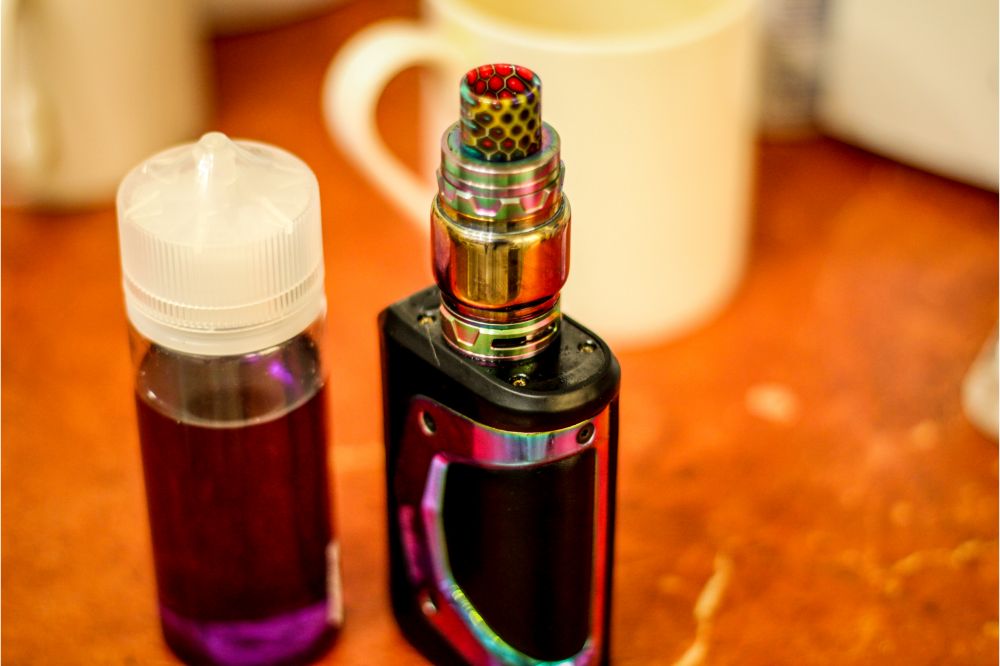Are Flavored Vapes Banned in Colorado?
Colorado’s Prohibition on Flavored Nicotine Vapes
In 2019, Colorado passed House Bill 19-1076 banning all non-tobacco and non-menthol flavored nicotine vaping products. This comprehensive flavor prohibition includes:
- A ban on retail sale of flavored nicotine e-liquids including fruit, candy, dessert, herb/spice, alcohol, mint, and other varieties besides tobacco and menthol.
- A prohibition on prefilled flavored nicotine vape cartridges and pods in any flavor besides tobacco and menthol.
- Banning flavored disposable nicotine vapes and all other pre-loaded flavored nicotine devices.
- Restricting sale of any vaping device, component, or accessory intended to give a flavored nicotine experience like flavored vape skins.
- Closing loopholes banning misleading descriptive flavor names like “action fruit” or “piña chill” intended to allude to prohibited flavors.
The flavor ban specifically targets manufacturers, distributors, wholesalers, and retailers. Individual possession of a personal-use supply of banned flavored nicotine vapes remains legal.
Background on Colorado’s Ban on Flavored Vape Products
Concerns over skyrocketing teen vaping rates in Colorado and nationally prompted legislators to approve a sweeping flavor ban in 2019:
SPIRITBAR Katana BP10000
- Slender, leather-textured body reminiscent of a katana handle for an authentic samurai feel
- Unique samurai-inspired e-liquid flavor - fruity yet not too sweet, with a luxurious, elegant aroma
- Powerful 650mAh rechargeable battery for extended vaping time
- Large 18ml e-liquid capacity and 10,000 puff capacity
- Advanced mesh coil and e-liquid & power display screens for optimal vaping experience
The special juice captures the essence of the samurai spirit with its rich, smoothly pulsating flavor that brings new satisfaction with every puff. The device's slender, leather-textured design evokes the grip of a samurai's katana, making this product a perfect choice for beginner vapors.
- Youth vaping prevalence in Colorado rose from 5% in 2013 to 27% by 2018 according to state surveys. Counteracting this became an urgent health priority.
- Most underage users cited flavors like fruit, candy, and dessert varieties as a primary reason for initiation and continued vaping.
- Studies indicated restricting flavors could significantly reduce vaping appeal to youth and minors under 21.
- By mid-2019, lung injury cases and deaths associated with illicit THC vapes raised general concerns over the vaping epidemic.
In December 2019, federal lawmakers followed Colorado’s lead by prohibiting flavored cartridge and pod sales nationwide except tobacco and menthol. The federal minimum age to purchase tobacco, including vaping products, also rose to 21.
SPIRITBAR Jack’s Flask 9000 Puffs
- Stylish pirate flask-shaped body providing an exciting vaping experience
- Delivering up to 9000 puffs per device
- 20ml e-liquid capacity with 50mg nicotine strength for satisfying throat hit
- Specialized pirate-themed e-juice flavors for rich, swirling taste
- Premium mesh coil optimizes flavor profile for maximum vaping enjoyment
This disposable vape captures the daring spirit of the high seas with its flask styling and signature pirate e-juice flavors. The extraordinary battery life provides 9000 indulgent puffs for extended vaping pleasure. Live boldly and freely with the Jack's Flask - a legendary vaping experience fit for a pirate's adventures.
Impact on Vape Shops and Retailers in Colorado
Colorado’s nicotine vape flavor ban has significantly impacted vape shops, convenience stores, smoke shops, gas stations, and other retailers:
- Most vape shop revenue came from flavored nicotine e-liquid sales. The ban cut into profits from vape hardware, accessories, and juice sales.
- Added licensing, compliance, inventory reporting, and regulatory costs have squeezed margins. Numerous vape shops have closed across Colorado since the ban took effect.
- Convenience store and gas station sales of popular flavored nicotine vape cartridges and disposables has declined. Several chains unsuccessfully sued Colorado to overturn the ban.
- Black market demand has emerged for smuggled banned flavored nicotine vapes. Harsh penalties limit broad illegal sales but small volume underground trade persists.
- Overall sales declines in Colorado vape shops following the flavor ban have ranged from estimated 30-60% as availability narrowed primarily to tobacco and menthol vape juice flavors.
Public Health Impacts of Prohibiting Flavored Vapes
Public health officials strongly supported Colorado’s flavored nicotine vape ban:
- Youth vaping rates in Colorado dropped from 20% in 2019 to 14% in 2021 following flavor restrictions and minimum age increases to 21.
- National studies indicate prohibiting flavored vapes lowers initiation rates among minors and adolescents under 21 by as much as 68%.
- With sweet, fruity, minty, and fun flavors banned, remaining tobacco and menthol vape products hold less appeal for teens and youth.
However, some research found adult switching to tobacco flavors and workarounds minimally reduces total adult vaping rates following bans. Potential increased risks from black market products lacking regulation remain a concern as well.
SPIRITBAR Katana BP10000
- Slender, leather-textured body reminiscent of a katana handle for an authentic samurai feel
- Unique samurai-inspired e-liquid flavor - fruity yet not too sweet, with a luxurious, elegant aroma
- Powerful 650mAh rechargeable battery for extended vaping time
- Large 18ml e-liquid capacity and 10,000 puff capacity
- Advanced mesh coil and e-liquid & power display screens for optimal vaping experience
The special juice captures the essence of the samurai spirit with its rich, smoothly pulsating flavor that brings new satisfaction with every puff. The device's slender, leather-textured design evokes the grip of a samurai's katana, making this product a perfect choice for beginner vapors.
Enforcement of Colorado’s Flavored Vape Ban
Several Colorado agencies work to enforce the prohibited flavored nicotine vape sales ban:
- The Department of Revenue’s Tobacco Enforcement Unit performs undercover sting operations and investigations of manufacturing and retail entities. Violators face heavy fines.
- Local police and health departments address citizen complaints of illegal flavored nicotine vape sales, issuing citations and penalties.
- Anonymous public tips help identify establishments ignoring the ban. Concerned teachers and parents are frequent informants.
- District attorneys take action against larger distributors trafficking in black market flavored nicotine vapes smuggled into Colorado.
Penalties for Violating the Flavored Vape Ban
Selling banned flavored nicotine vaping goods illegally in Colorado can result in:
SPIRITBAR Jack’s Flask 9000 Puffs
- Stylish pirate flask-shaped body providing an exciting vaping experience
- Delivering up to 9000 puffs per device
- 20ml e-liquid capacity with 50mg nicotine strength for satisfying throat hit
- Specialized pirate-themed e-juice flavors for rich, swirling taste
- Premium mesh coil optimizes flavor profile for maximum vaping enjoyment
This disposable vape captures the daring spirit of the high seas with its flask styling and signature pirate e-juice flavors. The extraordinary battery life provides 9000 indulgent puffs for extended vaping pleasure. Live boldly and freely with the Jack's Flask - a legendary vaping experience fit for a pirate's adventures.
- Fines starting at $400 and reaching up to $15,000 per violation for retail establishments.
- Permanent revocation and non-renewal of state tobacco retail licenses.
- Seizure and destruction of all prohibited flavored nicotine vaping products in inventory.
- Misdemeanor charges for smaller first offenses evolving into felony charges for major traffickers distributing black market flavored nicotine vapes.
The substantial penalties aim to deter retailers from blatantly violating the flavor ban through steep fines and license threats. However, some still attempt to sell prohibited items discreetly.
In summary, Colorado has one of the nation’s strictest bans on all flavored nicotine vaping goods besides tobacco and menthol. The ban significantly impacted vape businesses but achieved its primary goal of reducing youth vaping rates through removing flavors attracting adolescents and minors.



